Iran Trades Gold For Oil, Sidestepping Sanctions
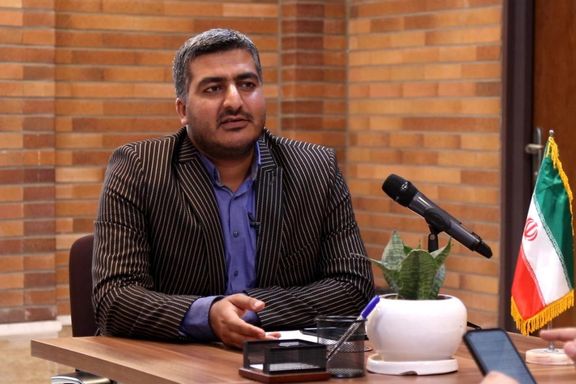
Iran is trading oil for gold with Venezuela, Turkey, and Lebanon, according to an Iranian economist.

Iran is trading oil for gold with Venezuela, Turkey, and Lebanon, according to an Iranian economist.
As the country finds ways to skirt international sanctions, Mohammad Hassan Gholami said Wednesday that Tehran has received gold from its allies in exchange for oil shipments.
Gholami, who is also the head of Iran's GoldMoney Association, claimed that "the Muslim world has moved towards goldmoney" and away from traditional currency, with countries like Malaysia and Kuwait also welcoming it.
Gholami, one of the proponents of "Islamic economy", criticized the Iranian authorities for what he called "sticking to the dollar" and called for ditching the US currency in favor of local, even though Iran's Rial has fallen to its lowest in decades amidst soaring inflation.
His statements came as the Islamic Republic has been subjected to the most severe economic sanctions, including exclusion from international financial exchanges, due to its nuclear activities and more recently, for its brutal crackdown of protests.
The Iranian regime has long been considering selling oil in exchange for gold.
Last year, in a confidential warning to its clients seen by Iran International, London-based Lloyds Marine Insurance Company said that the Quds Force of the Islamic Revolutionary Guard Corps and Hezbollah illegally send gold from Venezuela to Iran to finance the terrorist activities of Tehran-backed militias in Lebanon, bypassing sanctions.
Lloyds further added that flights from Caracas to Tehran via Mahan Air are being used as an illicit channel to ship gold to pay for Iranian oil, in breach of applicable sanctions.
“The gold is then sold in Turkey, and other Middle Eastern countries, to generate funds for terrorist activity,” the leaked document alleged.

As Iran's March 1, 2024, parliamentary elections near, the government and political groups considered regime insiders gear up for the occasion.
The media in Iran reported early this week that Interior Minister Ahmad Vahidi appointed his Political Deputy Mohammad Reza Gholamreza as the Chairman of the Election Headquarters. The appointment is self-explanatory and marks the importance of the event for the government.
Apart from the 290 members of the Iranian parliament (Majles), 88 seats of the assembly of experts are also up for grabs on the same date.
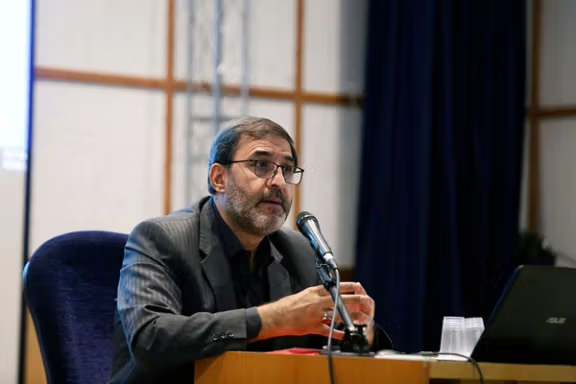
Less than ten months before the elections, media affiliated with various segments of the political landscape have started to play with the news to support their own possible candidates, to tarnish the image of their opponents and to spread disinformation for various reasons.
IRGC-Linked Tasnim news agency reported on Monday that former Majles Speaker Ali Larijani is planning to nominate himself as a candidate as well as presenting a list of other likeminded candidates.
Etemad online has confirmed the report after seeking the views of politicians close to Larijani who was the longest serving speaker of the Iranian parliament from 2008 to 2020. In the meantime, other news sources have reported that former President Hassan Rouhani is going to support Larijani and help him to set up his campaign. While there has been no confirmation or denial from Rouhani in this regard, Larijani later denied Tasnim's report.
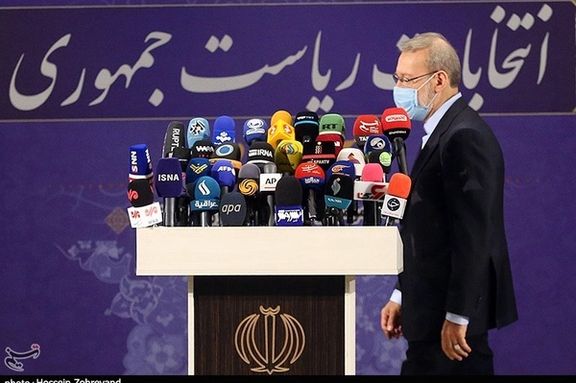
According to Ruydad24 new website, media and politicians are speculating over three different scenarios about the results of the upcoming elections and its impact on the country's political landscape.
The most optimistic scenario is that the regime will allow some moderate conservatives to enter parliament and form a weak minority against an ultraconservative majority like the one that is currently in place, wrote Rouydad24.
However, Sazandegi newspaper wrote that so far there is no indication that the regime’s core might give up the idea of consolidating power within the conservative camp. The daily added that this is a likely option for the hardliners considering the crisis of governance under their reign.
The regime has a choice between a tightly engineered election, similar to the 2020 parliamentary and the 2021 presidential votes that gave the power to hardliners or allowing more moderate insiders also to get elected.
In case of the first option, large segments of politicians and the lectorate will most likely boycott the vote, especially after the popular protests and simmering antipathy toward Supreme Leader Ali Khamenei and his loyalists expressed in the streets.
According to Rouydad24, the most likely scenario for the upcoming election is that the regime will stick to its current totalitarian form and would want to keep all power by allowing Khamenei loyalists to dominate the state.
Nonetheless, the protests and the deepening economic crisis have proven that a consolidated conservative government does not necessarily mean that hardliners are united. There have been serious infightings within the conservative camp this year even during recent days as a member of the parliament close to populist former President Mahmoud Ahmadinejad brought about one of the biggest rifts between the Majles and the government by disclosing a major political and economic corruption case.
There is also the distant possibility of a proreform victory if Khamenei decides to free himself from the current political and economic impasse and allow centrists and reformists to run in the elections.
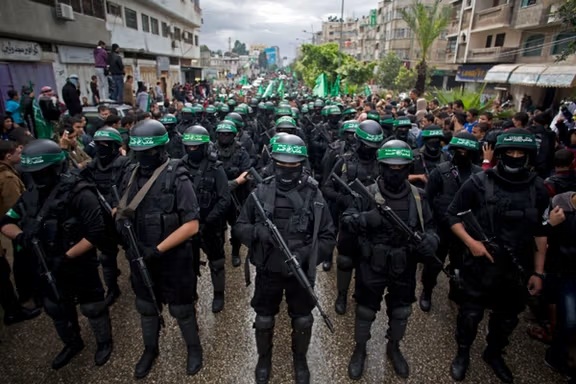
Iran has urged Hamas to join Islamic Jihad in a new round of attacks against Israel following the killing of three militants in Gaza, Iran International has learned.
According to informed sources, Tehran exerted strong pressure on Hamas to respond to assistance it has received over the years and unite with Islamic Jihad, a close affiliate of the Iranian regime, to launch a fresh wave of attacks.
In a surprise air strike early Tuesday, Israel killed three Islamic Jihad commanders in Gaza, who had planned attacks from Gaza and the Israeli-occupied West Bank.
A large number of rockets were fired from Gaza into Israel Wednesday afternoon, in what appeared to be Palestinian retaliation for the targeting of Islamic Jihad commanders.
Dawoud Shehab, a spokesperson for the Iranian-backed Islamic Jihad, had said Israel "must expect a response at any moment and anywhere,” but one day after the air strike, a tense calm still prevailed.
The chief of Iran’s general staff Mohammad Bagheri said Wednesday that Iran “will assist Palestine with all its power,” according to Tasnim news agency affiliated with the Revolutionary Guard (IRGC).
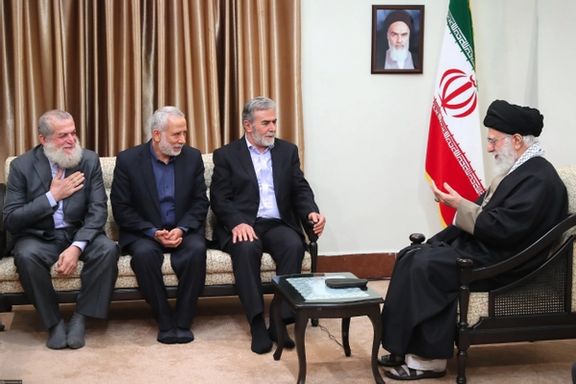
Meanwhile, one source told Iran International that Tehran’s pressure has deepened existing policy disagreements among Hamas leaders.
As a tense calm prevailed earlier on Wednesday, Prime Minister Benjamin Netanyahu said Israel is ready to fight Iran on multiple fronts if needs be. He insisted that “95% of Israel’s security problems come from Iran,” referring to “an attempt by Iran to start a multi-front campaign against us.”
Israel blamed Iran for a large-scale military confrontation in early April when Palestinian groups aligned with the Islamic Republic launched hundreds of rockets against Israel from Gaza and Lebanon.
Iranian officials did not try to hide their satisfaction that the “resistance front”, as they call their militant proxies in the region, had “humiliated Israel.” IRGC commander, in particular, call for more military action, boasting that end of Israel is near.
Israel “will do all it can to prevent Iran from establishing terror fronts around us,” Netanyahu said at a conference for a right-leaning group of former senior defense officers.
Iran International’s sources say Hamas leaders in Gaza understand that a new military confrontation will hurt Palestinian civilians and their livelihood. They also have to face the danger of being targeted by Israel. However, leading figures living outside Palestinian territories and enjoying more security and close cooperation with Iran advocate for joining the Islamic Jihad in a new confrontation with Israel.
Iran reached a Chinese-brokered agreement with Saudi Arabia in March to restore diplomatic relations after a seven-year hiatus. Official in Tehran have repeatedly claimed that the move was a strategic defeat for the United States and a victory for Iran.
Having partly reduced their isolation in the region, the Iranian regime seemed emboldened and intensified its rhetoric against Israel in March and April.
Meanwhile, Israel is not just concerned about attacks by Tehran’s proxies and allies, but is also worried about its expanding nuclear program.
By most estimates Iran has accumulated enough enriched uranium to be able to build up to five nuclear weapons within a few months.
Netanyahu also reiterated in statements on Tuesday and Wednesday that Israel will do all it can to stop Iran from obtaining a nuclear weapon and will try to prevent Iran from “establishing terror fronts around us.”
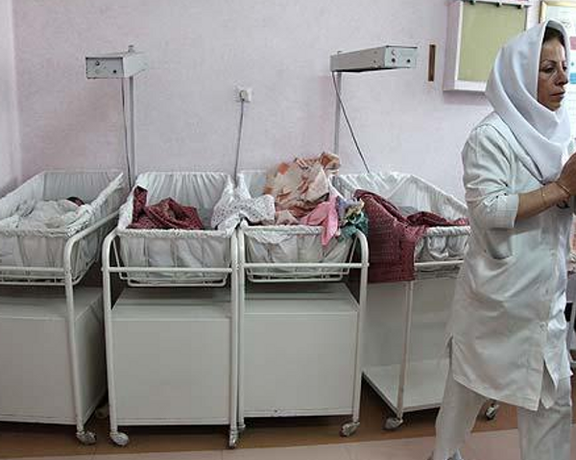
Iranian authorities shut down a clinic Sunday, after they said a “volunteer force” has been established to identify doctors and clinics who carry out abortions.
Public Relations of Tabriz Medical Sciences University said in a statement Monday that various organizations including the university, Basij Physicians Militia of the Revolutionary Guards’ (IRGC), the justice department of East Azarbaijan Province, and police identified and sealed the clinic.
At the same time, Saber Jabbari-Farouji, head of the health ministry’s Center for Rejuvenation of Population, that a volunteer group called Nafas (life) has been formed to help prevent abortions. Iranian media have dubbed the group as “[Anti-] Abortion Patrols”, similar to hijab enforcement units.
Abortions have always been illegal in the Islamic Republic unless when the fetus is diagnosed with genetic disorders or carrying the fetus to term threatens the mother’s health or life. In such cases, terminations are permitted and legally carried out during the first four months of the pregnancy.
An official of the health ministry, Soleiman Haydari, told the Iranian Students News Agency (ISNA) on April 17 that annually around 10,000 abortions were legally carried out. Without giving the number of illegal abortions, he said over 70 percent of these were done by midwives, often by prescribing pills, or at home.
Another official of the ministry, Saeed Karimi, said on April 3 that President Ebrahim Raisi had ordered all government bodies to cooperate to stop the supply of abortion pills.
Karimi said the laws regarding illegal abortions were more strictly enforced “recently” and that all pregnancies were being documented to prevent illegal abortions so that the population of the country could grow.
The childbirth rate in Iran has been steadily declining over the past few decades. In the early 1980s, the population growth rate reached 4.8 percent. This rate has dropped to below one percent in the past few years.
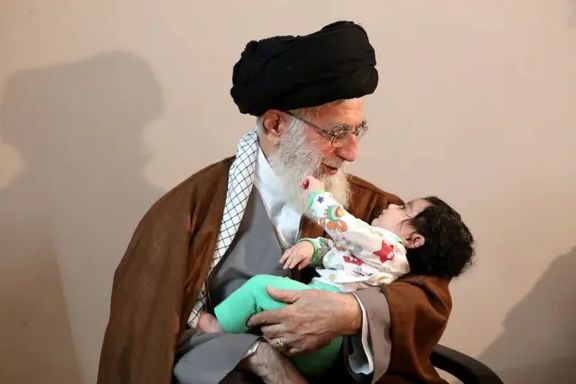
Iran’s Supreme Leader Ali Khamenei believes efforts to increase the country's population are among the most urgent duties and essential policies of the Islamic Republic as the leading Shia country in the Muslim world.
Iran in recent years has promoted marriage and having children as a response to an ageing population. Some religious figures have joined the campaign. Ayatollah Jafar Sobhani in 2014 warned that the Saudis – where the ruling Saud family is Sunni – were plotting to obliterate the "absolute majority of Shiites in all Iranian cities."
Iran's population has doubled from around 40 million in the early 1980s to 84 million, but a declining birth rate means the median age at 32 is about the same as Saudi Arabia at 31.8, but higher than Iraq at 21.
Khamenei has repeatedly stressed that Iran’s population needs to increase to 150 million to avoid becoming a land of old people. The population is projected to peak at around 100 million by 2050.
In response to Khamenei’s calls, the parliament dominated by hardliners approved a law in March 2022 requiring state entities to encourage marriage and childbearing. The law banned public health services offering family planning including contraceptives, vasectomies and tubectomies as well as free dispensation of contraceptives other than where pregnancy would threaten a woman's health.
Critics of a population increase policy say that the Islamic Republic has not been able to boost the living standards, with more than 35 percent considered to be living under the absolute poverty line according to official statistics and many more living in increasing hardship despite having multiple jobs.
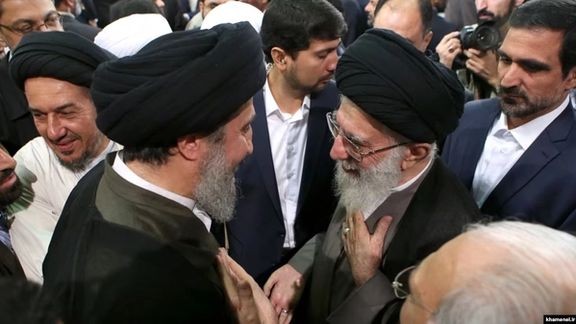
Iran International has obtained more information revealing that an aide to former Quds force commander Qassem Soleimani is a key figure in money laundering for Tehran.
Hamid al-Husseini is an Iraqi-born Shiite cleric who is the head of Iraq’s section of the Islamic Radio and Television Union (IRTVU), an affiliate of the Iranian Ministry of Culture and Islamic Guidance that is practically run by the Revolutionary Guards (IRGC). The union has more than 200 media outlets in 35 countries, including 100 satellite TV channels, 30 radio stations, and dozens of websites -- several of which are in Iraq.
Al-Husseini has close connections to the Office of Supreme Leader Ali Khamenei and a was trusted companion of former Soleimani, who was killed in a US drone strike in January 2020.
The Iraqi city of Najaf issued an arrest warrant for Husseini on terrorism charges in 2021, accusing him of orchestrating an attack on the Al-Rafidain Center for Dialogue. However, Iraqi authorities have not acted upon the warrant.
Al-Rafidain Center for Dialogue is a non-governmental organization established in Najaf in 2014 to shape public opinion in support of the democracy, peace and sustained development, but al-Husseini – under the influence of Khamenei – believes that the center is tasked with normalizing relations with Israel.
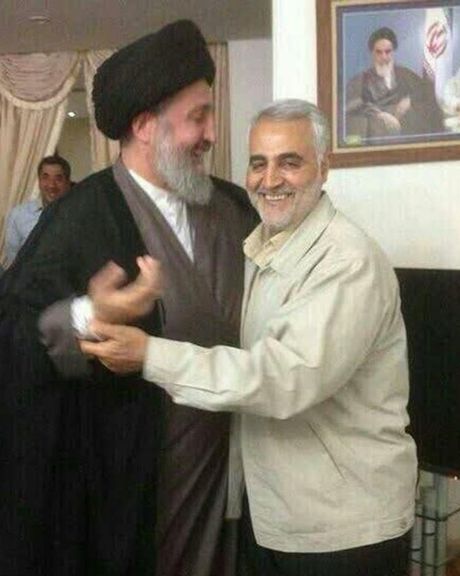
According to Iran International's Mojtaba Pourmohsen, al-Husseini has managed to get the right to broadcast football (soccer) matches in Iraq for the Popular Mobilization Forces, an Iranian controlled Shia umbrella organization of more than 60 different armed factions, with around 128,000 fighters.
Apparently, al-Husseini has been using the media empire to promote the ideology of Iran’s ruler as programs on the sidelines of the matches. However, according to the Financial Action Task Force (FATF), a global anti-money laundering watchdog, the cash-rich sport is among the most vulnerable to money laundering, with the United Nations Office on Drugs and Crime estimating that about $140 billion is laundered globally through soccer each year.
Hacker group Backdoor (3ackd0or) provided Iran International with documents showing al-Husseini and several other people working with him launder money for the Islamic Republic in Iraq.
Al-Husseini, who also has an Iranian citizenship ID and a home in one of the northern neighborhoods in the capital Tehran, has connections in Iraq’s financial institutions and uses them to launder money for the IRGC and the Iranian regime.
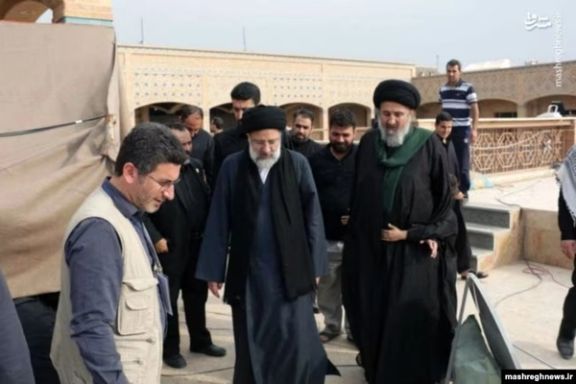
Moreover, the Islamic Radio and Television Union provides militia media outlets in Iraq with financial, technological, and organizational support, helps train their personnel, and devises a unified strategy for them to follow, according to the Washington Institute.
The US Treasury Department designated the IRTVU in October 2020 for being owned and operated by the IRGC’s Quds Force, in effect extending its designation of the IRGC as a Foreign Terrorist Organization to its media arm. The Treasury Department said at the time that IRTVU is “a propaganda arm of the IRGC-QF.” Not only does the IRGC have a hand in directing the military operations of Iranian-backed proxies, but it also takes a role in their media affairs, advocacy group United Against Nuclear Iran (UANI) said.
According to UANI, the US Department of Justice (DOJ) seized 33 websites used by the IRTVU in June 2021, including those associated with Al Alam TV and Press TV, adding to the 92 IRGC-linked domain names seized in 2020, based on a prior Department of Justice (DOJ) determination that the IRTVU disguised itself as a legitimate “news organizations or media outlets [to] target the US with disinformation campaigns and malign influence operations.”
Earlier in the year, Iran International unraveled some details about the inner workings of a Quds force unit tasked with smuggling money from Iraq to Iran.

According to the information, the Islamic Republic’s embassy in Iraq is also involved in the money laundering operations aimed at funneling revenues from oil and gas exports back to Iran. As per a repeatedly extended sanctions’ waiver by Washington, Tehran is only allowed to import medicine and some essential goods from Iraq in exchange for its exports.
This financial network is bypassing the US sanctions at the cost of the Iraqi economy. An informed source in Baghdad told Iran International late in December that Washington has received reports that Iraq is still conducting trade with Iran using US dollars despite sanctions.
The dinar went into a tailspin against the dollar after the New York Federal Reserve imposed tighter controls on international dollar transactions by commercial Iraqi banks in November to halt the illegal siphoning of dollars to Iran.
Under the curbs that took effect in January, Iraqi banks must use an online platform to reveal their transaction details. But most private banks have not registered on the platform and resorted to informal black markets in Baghdad to buy dollars.
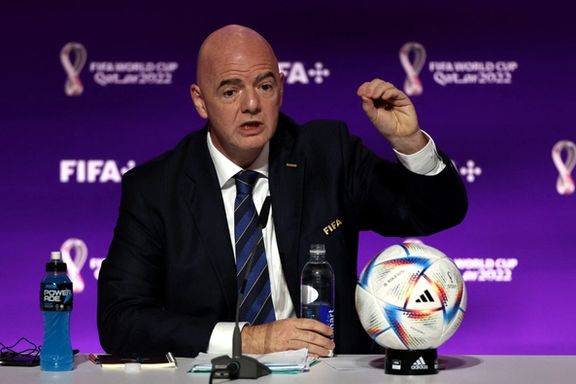
Iran’s minister of sports says that the FIFA President Gianni Infantino's visit to Tehran is not about the ban on women entering stadiums to watch matches.
Earlier, the president of Iran’s Football Federation Mehdi Taj announced that Infantino will visit Iran soon. However, some speculated that his trip is to follow up on the issue of the ban.
Sports minister Hamid Sajjadi claimed on Tuesday that “the issue of women's presence in stadiums has been resolved and women will “proudly” enter the sports complexes to watch games in the future.
His claim comes as recently police used violence to bar a group of female fans of Esteghlal and Persepolis soccer clubs to prevent them from entering the Azadi stadium in Tehran .
The international governing body of the football association (FIFA) has tried to convince Iran’s government to lift the unwritten four-decade-old ban on women attending stadiums to watch male players.
However, the Iranian federation as well as security and law enforcement agencies are not following FIFA's directive under the pretext of lack of infrastructure to keep women in separate sections, apart from male spectators.
On some occasions when a limited number of women have been allowed in stadiums, they were placed in separate sections, not mixing with men but the ban has subsequently led to many arrests, beatings, detentions, and assaults against women.
This restriction is based on the country’s strict Islamic laws. Iranian officials have always argued that male football fans swear profanities, so the atmosphere of stadiums is not suitable for women even if they are seated in a separate sections.